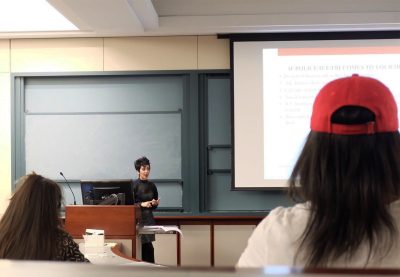
Nearly thirty Boston University students gathered for a Know Your Rights training hosted by the Boston University Diversity in Law Association and the American Civil Liberties Union of Massachusetts in the Questrom School of Business on Thursday night.
The organizations held the event to convey the vital importance of protecting citizens amid the current hostile political climate, BU DLA Co-President Raina Hasan said before the training.
MA ACLU representatives began the training by briefing participants on police encounters and protests, the work they’ve been doing locally and the ways in which individuals can get involved.
MA ACLU Field Director Matthew Allen said this type of training is meant to bolster public education on important matters.
“The purpose of the workshop is to ensure that people understand their constitutional rights and know how to assert them in encounters with law enforcement,” he said before the training.
The DLA invited the MA ACLU to raise campus-wide awareness of people’s civil rights and privileges in a political climate filled with unfriendly and isolating rhetoric, Hasan, a junior in the College of Arts and Sciences, said.
“The residing administration has proven to have a deep-rooted disrespect for the fundamental rights of certain groups of people,” she said. “Measures ranging from executive orders that undermine constitutional rights to the continuous stream of falsities and flippant comments made by the President himself is troubling, to say the least, for many minority communities.”
Hasan also said students, including those at BU, have historically been crucial players in times of social change.
“By engaging the student body in important conversations, we hope to do our alumni such as Howard Thurman and Dr. Martin Luther King Jr. proud,” she said. “However, effective social activism starts by first educating ourselves on what rights we as individuals, citizens, immigrants, students and dissenters are entitled to.”
Hasan said she hoped participants left with a sense of reassurance and a heightened awareness.
“I think it has been very easy for many of us, especially millennials to take for granted the rights and privileges we have had in this country,” Hasan said. “[The DLA hopes] that for people who have never really had to worry about knowing their rights if they are ‘randomly’ stopped by police or if an ICE officer comes knocking on their door that they are able to carry with them a deeper sense of empathy that guides what causes and campaigns they choose to support in the future.”
Hosts taught participants how to assert their rights in police encounters, the definition of probable cause and reasonable suspicion, how to comprehend the different thresholds that police must meet to escalate encounters with civilians, who to contact if their rights are violated and how to identify resources for further learning.
The MA ACLU has been hosting similar events on different college campuses throughout the state, such as Clark University and Harvard University, Allen said.
Several students who attended the presentation said they found the training informative.
Ningyin Zhao, a sophomore in CAS, said she came to the training to learn about her rights as a non-citizen.
“I was curious about what my rights were.” Zhao said. “I’m not a citizen yet, so I said to myself, ‘Huh. Maybe I should know these things and get educated about them.’ Given the current political situation, there are going to be a lot of things that people encounter, and having the information ready at hand to know how to react in those situations is key.”
Cecelia Thai, a senior in CAS, said this training was essential for students who were unfamiliar with their rights.
“I think in general, especially as students, we are not aware of our rights.” Thai said. “We might be told in the media or by other means, but we don’t exactly know them, and it’s also good in case we do get into those situations.”
Hector Meneses, a sophomore in Questrom, said he is glad students were given the opportunity to learn about their privileges.
“I definitely learned a lot about our rights, and the difference between civil disobedience and protesting” Meneses said. “This idea that we have a right to not say anything and a right to an attorney was a theme for the whole entire presentation. Personally, the fact that this information is accessible to students is great, and I’m hopeful that more
similar events will be done in the future.”




